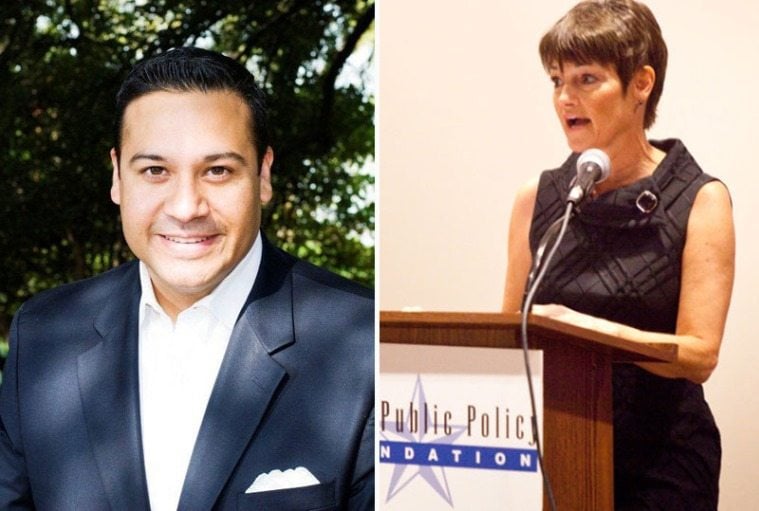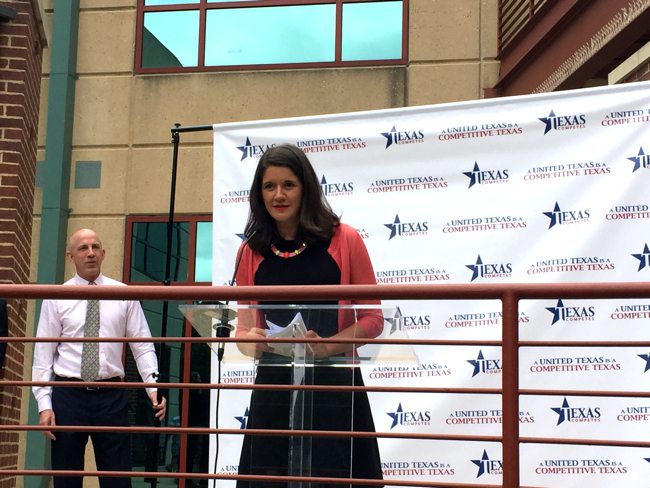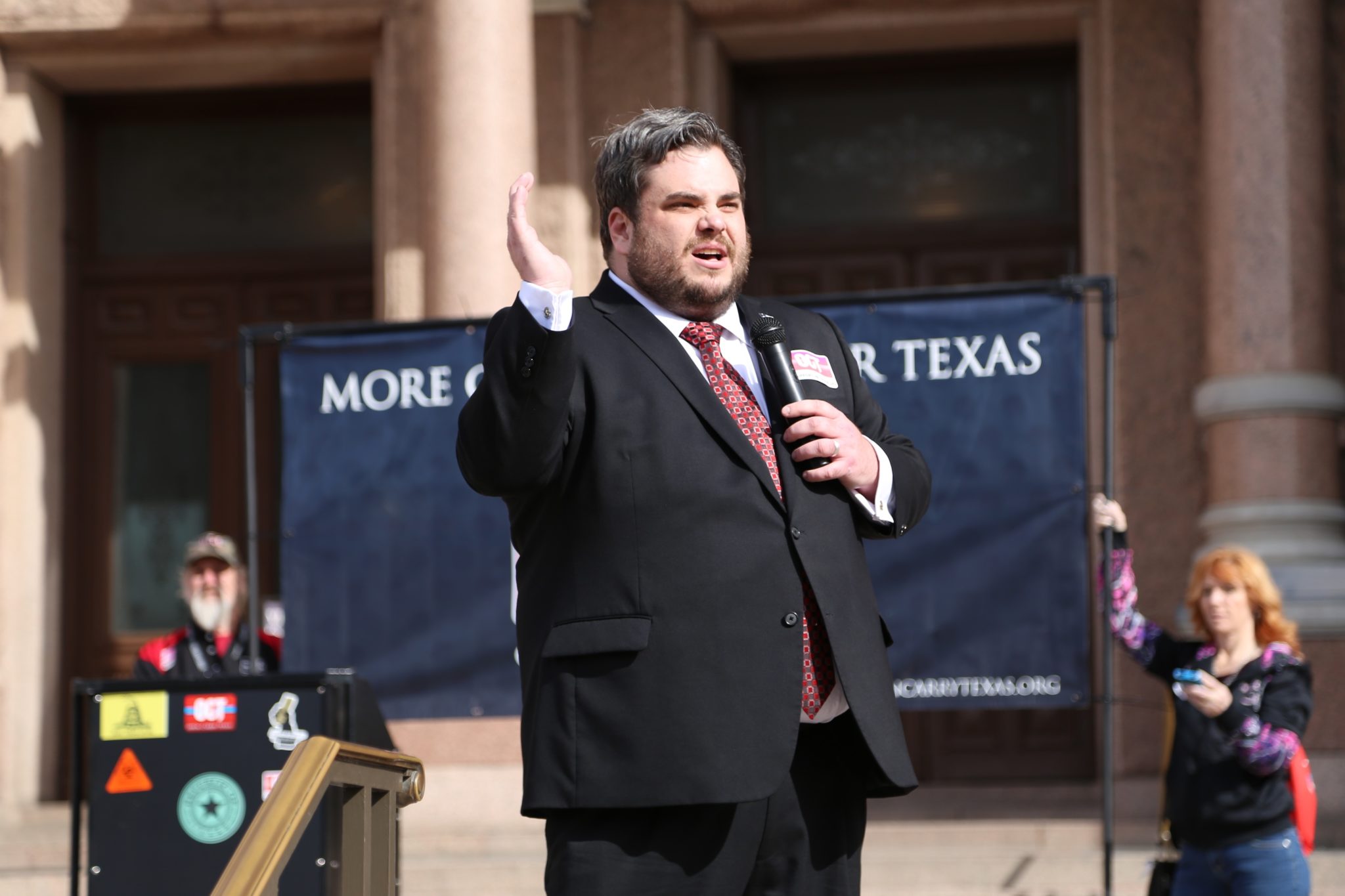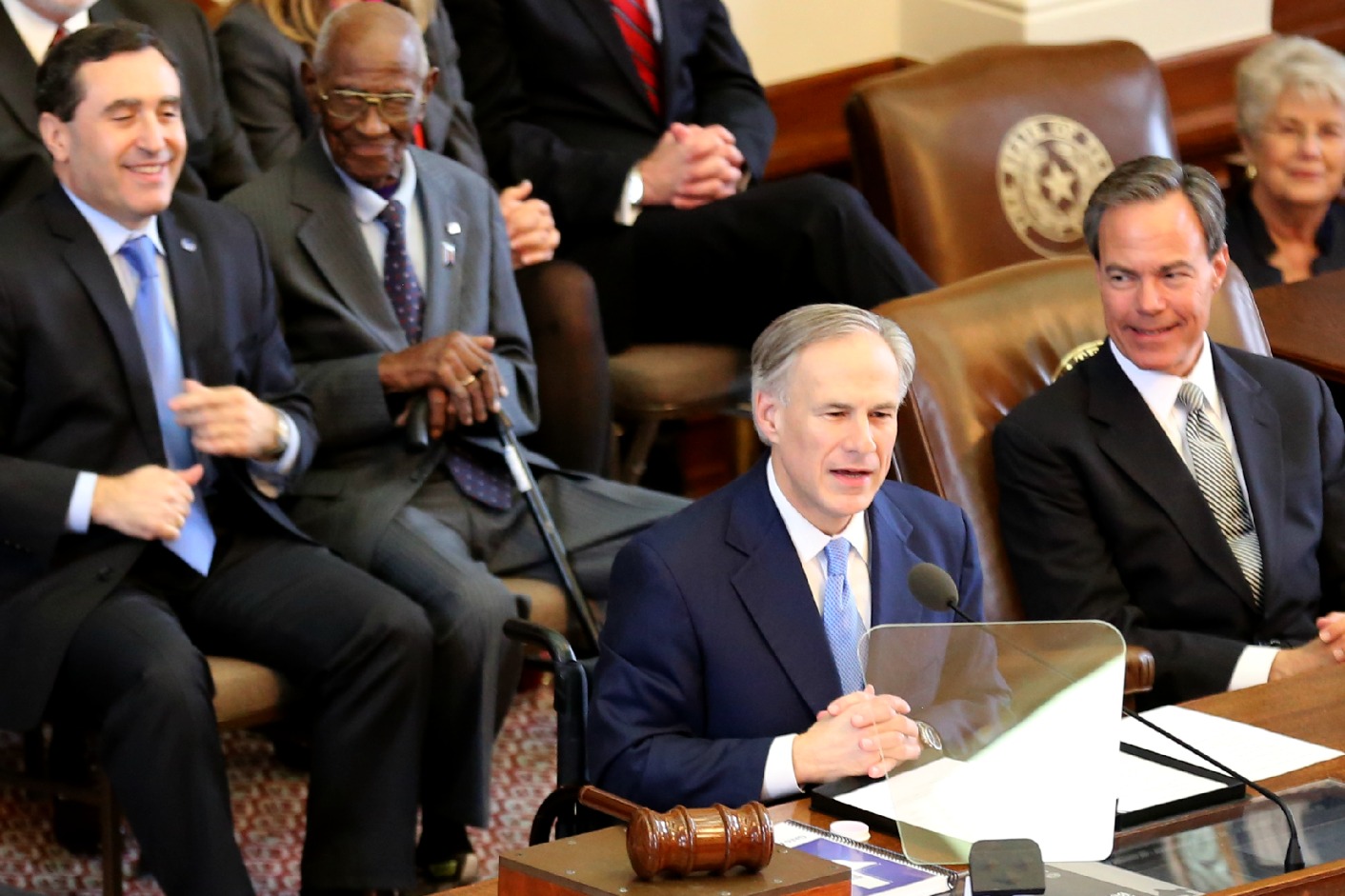
Laws Of Unintended Consequences
Opponents claim religious freedom proposals could open the door to Sharia law, faith-based abortions and cost Houston the 2017 Super Bowl.

Above: A woman waits in line outside a rally in opposition to Houston's Equal Rights Ordinance in November.
Some call them “license to discriminate” measures, since they’d theoretically allow individuals and businesses to claim religious exceptions to anti-bias laws protecting LGBT people.
But when it comes to the negative impacts of two proposed religious freedom amendments to the state Constitution, anti-LGBT discrimination is just the tip of the iceberg, according to legal experts and other panelists who spoke during a briefing at the Capitol last month.
SJR 10 and HJR 55—by Sen. Donna Campbell (R-New Braunfels) and Rep. Jason Villalba (R-Dallas), respectively—would upend the balance between religious and government interests that’s been effectively maintained in Texas since 1999, when the state’s Religious Freedom Restoration Act (RFRA) became law, attorneys from the ACLU and the Anti-Defamation League said. By tipping the scales in favor of religion, the proposed constitutional amendments would open the door to a host of grave unintended consequences, such as domestic abusers using them as a defense to criminal charges; medical professionals refusing to provide life-saving treatments based on their beliefs; and workers being fired for violating the tenets of an employer’s faith, the attorneys said.
In fact, the resolutions could even give a foothold to Sharia law in Texas and cost Houston the 2017 Super Bowl, one Republican panelist representing the business community suggested.

In response to concerns raised during the briefing, Sen. Campbell issued a statement defending SJR 10.
“The right to freely exercise one’s religion does not stop at the doors of our churches or synagogues, but extends to all aspects of our lives, including our businesses,” Campbell said. “Texans should be free to run their businesses in accordance with their faith, not forced by government entities to surrender their religious identity or act against their conscience. … Over-the-top rhetoric and fear-mongering from groups with a history of intolerance toward traditional religious values is just that and fails the truth test.”
Campbell’s resolution would bar government from burdening the “freedom of religion or right to act or refuse to act in a manner motivated by a sincerely held religious belief,” whereas Villalba’s would bar government from burdening “in any way a person’s free exercise of religion.” Both resolutions make exceptions for when there’s “a compelling governmental interest” and it’s “the least restrictive means of furthering that interest.”
“HJR 55 and SJR 10 are completely different measures that focus on different issues and each have different intents,” said Villalba, an attorney. “I think I agree largely with some of the concerns from a number of the panelists about how language like that [in SJR 10] could result in unintended consequences, which is why we drafted HJR 55 in a much narrower, much more tailored way.”
However, opponents of the resolutions say they’d have a similar effect. Legal experts who oppose the resolutions say one major problem is that unlike the Texas RFRA, both remove the word “substantially” before “burden,” lowering the threshold for religious claims. They also note the RFRA includes other carefully crafted language designed to prevent unnecessary lawsuits and ensure the law isn’t abused, including exceptions for civil rights and zoning.
“I guess the whole point is that we don’t know what’s going to happen. What we know is that we have a standard that works,” ACLU of Texas legal and policy director Rebecca Robertson said. “I don’t think that his [Villalba’s] language is any more limiting. Just like the Senate version, he eliminates the qualifier ‘substantial.’ By taking out that qualifier ‘substantial,’ you open it up.”
Sanford Levinson, a professor of law at the University of Texas who reviewed the resolutions independently at the request of the Observer, largely agreed with Robertson’s analysis.
“A lot of lawyers would say that the word ‘substantial’ has some real meaning to it, and that dropping it means that you’re going to give any litigant the right to say, ‘I feel burdened,’ and that will be that with regard to forcing the state to show the compelling interest,” Levinson said. “If that’s not what you’re out to do, then I’m not sure what the point of the amendment would be, because the state RFRA seems to be quite strong, so why do we need this?”
The only other state that has enshrined a similar provision in its constitution is Alabama—where, coincidentally, the ACLU recently found itself on the other side of the issue. Last year, the ACLU filed a lawsuit against the state based on the religious freedom amendment after Alabama officials shut down a camp for sex offenders operated by a church, due to a state law prohibiting them from living within 300 feet of each other on the same property. Last week, an Alabama probate judge cited the religious freedom amendment in defense of his decision not to issue marriage licenses to same-sex couples.
Kathy Miller, president of the Texas Freedom Network, which hosted the briefing along with the ACLU, the ADL and Equality Texas, noted that similar proposed constitutional amendments were introduced in both the 82nd and 83rd Legislatures. In 2011, a Senate version carried by then-Sen. Dan Patrick was left pending, while a House companion was defeated in an 82-32 floor vote. In 2013, the religious freedom amendments were left pending in both chambers.
“They are so sweeping and they create so many hidden and unforeseen consequences that you found very unusual and unlikely allies in opposition to these constitutional amendments,” Miller said, noting that concerns were raised about creating a religious right to abortions or giving Westboro Baptist Church free rein to picket military funerals.
“It doesn’t just change the Texas RFRA; it trumps every related statute in the entire history of Texas,” Miller said.
Villalba responded that his amendment would only trump RFRA if there’s a conflict between the two.
Panelist Lowell Denton, a litigator and constitutional adviser to local governments in Texas, said the resolutions would pave the way for people who want to have home prayer meetings to ignore parking regulations and “destroy the neighborhood for the rest of the people in that community.” He said the resolutions would also allow churches to opt out of basic safety requirements, such as installing fire sprinklers, because the associated expense could be defined as a burden.
Villalba countered that parking and fire safety regulations would qualify as compelling governmental interests, but Denton and others argued that under the resolutions, those questions would be left up to judges.
Cheryl Drazin, Southwest civil rights counsel for the ADL, cited the example of a defendant accused of spousal or child abuse relying on the amendments in court.
“His religion teaches him that he needs to have control of her and he needs to establish that control in the home,” she said.
“I’m worried about the government saying to ordinary Texans that you cannot exercise your religion in a way that has been commonly protected for decades under the current United States Constitution.”
And while anti-LGBT discrimination is a hot topic, the amendments would allow businesses to refuse service to people based on “any immutable characteristic you can think of,” Drazin said.
“I don’t think it can be overstated how broad the impact would be,” she said. “The direct correlation between these amendments and an increase in litigation is unquestionable.”
Rudy Oeftering, a gay Republican who is the former chair of the Texas Association of Business, said the resolutions would create “workplace religious war zones” between, for example, Muslim and Jewish employees.
“If you want to kill this legislation with religious conservatives, start bringing up the fact that Sharia law gains a stronger hold,” Oeftering said.
He added that the mere introduction of the resolutions has already caused harm to Texas’ reputation as a business-friendly state. Republican Arizona Gov. Jan Brewer vetoed a similar proposal last year amid “organic, sustained and severe backlash” from the business community—as well as the threat of losing the 2015 Super Bowl, Oeftering said.
In Arizona, opponents of the legislation rallied around the assertion it would create a “license to discriminate” against LGBT people, but Villalba has insisted his measure isn’t intended to target anti-bias laws in Texas.
When asked if he’d consider adding civil rights exceptions from the Texas RFRA to his resolution, Villalba said constitutional amendments don’t typically include that level of detail. However, Villalba’s proposed amendment is unusually specific when it comes to homeowners associations, which he said he included because they wouldn’t otherwise be considered political subdivisions of the state, adding that he’d be willing to remove that provision.
Villalba said HJR 55 was drafted in response to incidents including a nativity scene on government property that was challenged in Cherokee County, a valedictorian who had his speech cut off when he began espousing his Christian beliefs, and an elementary school student who was told he couldn’t read his Bible in school.
“I’m worried about the government saying to ordinary Texans that you cannot exercise your religion in a way that has been commonly protected for decades under the current United States Constitution,” Villalba said. “I know the controversy has been created by these kinds of measures because they’re also used for other purposes, but that’s not what we’re intending to do, and we’re intending to make sure that it’s very limited and very narrow in scope.”


